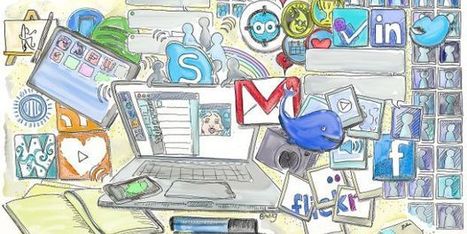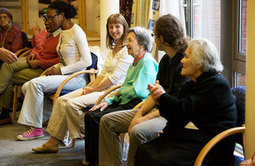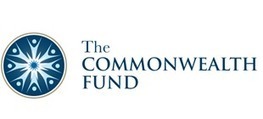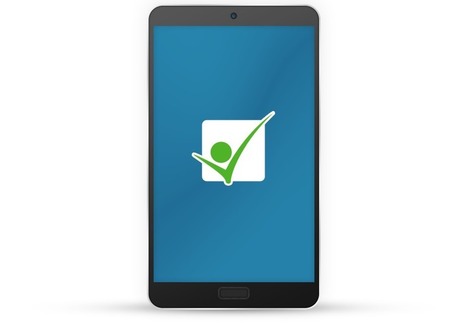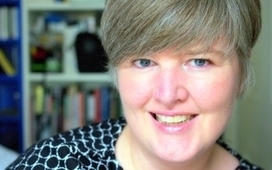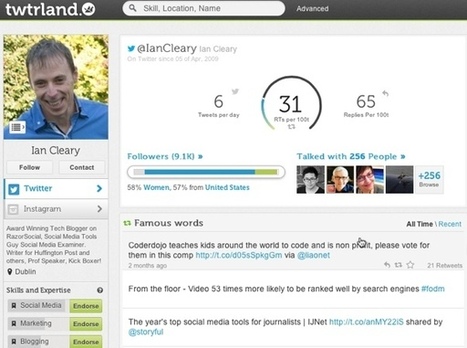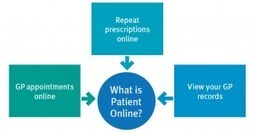 Your new post is loading...
 Your new post is loading...

|
Rescooped by
Andrew Bateman
from Social Media and Healthcare
October 27, 2016 10:04 AM
|
Technology enabled care provides practices with opportunities to improve the quality of care their patients receive, as well as reducing costs and demands on their services. In Stoke-on-Trent we believe that practices should commit to using social media as one of their modes of technology enabled care. So not only are patients in 20 or so of our 52 practices using social media now, but they are also chatting to each other about health related issues online. This may range from positive discussions about leisure and health services that are running in their area or complaints about local hospitals or GP access. Why Facebook? So to influence the conversations they are having we can’t do that if we are sat outside looking in – our GPs and practice teams have to be part of it. Although we may be nervous about our practice having a Facebook page, the fact that any one of our patients can already comment on us online –for instance NHS Choices- that can be seen by other patients makes whether we want to use the internet or not, irrelevant. With this in mind our CCG supported practices to take the plunge with social media 18 months ago, and we have not looked back since. We started small – just eight practices – and sought the help of an external social enterprise organisation to help us set up and build our audience. Once we were up and running, word got round other practices and more of them have joined in too. Who’s using it? Facebook has invariably become the channel of choice in the 20 or so practices that are actively participating, regardless of whether or not they use it in their private lives. A 2014 Ofcom report noted that Facebook remains the default social networking site for almost all UK adults who are online – 96%. The figures are staggering with between 30-33 million people using Facebook in the UK. When we have delved further into our data for Stoke-on-Trent practices we found that 86% of users are female and 65% aged between 35-65 years. More patients are engaging with us on Facebook aged over 55 years than under 25 years. Any claims that Facebook is for younger people are not supported by our data. So it makes sense to use this channel to share important health messages as well as information relating to our practices. The impact is impressive too. A video promoting the services available in one practice with a 10,000 list size, reached over 12,000 people, had 2,400 views and was shared by over 100 patients. Facebook for wight management The idea for a Facebook weight management group came from practice nurses themselves. The purpose of the group was to enable nursing staff to provide valuable information and self help tips to patients, whilst creating online communities of likeminded patients to support each other. Messages posted to patients vary and range from exercise routines and diet advice to information on other services available. Key differences between the Facebook pages and groups we run is that every patient in the group will receive the post, whereas not every person who likes a page will get the update. So once we had agreement from patients to join the group we had a captive audience ready to receive our information. Getting through to our patients The beauty of using social media is that it provides direct access into the homes of our patients. It isn’t without its risks, which is why we’ve managed it carefully. Practice staff have been trained and supported and we’ve developed a helpful social media toolkit for staff. What next? Our challenge is now to double the number of practices actively using social media in Stoke-on-Trent to over 40. Then we firmly believe we’ll reach a tipping point where the remainder will want to participate in social media too and learn from the wealth of knowledge and experience amongst existing practices.
Via Plus91

|
Scooped by
Andrew Bateman
October 16, 2016 4:30 PM
|

|
Rescooped by
Andrew Bateman
from Social Media and Healthcare
August 21, 2016 3:54 AM
|
“We trust our employees with patients’ lives. Why wouldn’t we trust them with social media?” I’ve shared this quote from Dean Royles, ex-Chief Executive of NHS Employers many times as it highlights the importance of trust in workplaces when it comes to social media. This week Barking, Havering and Redbridge University Hospitals NHS Trust is holding its first ever social media week. They’re doing exceptional work, and I’m delighted to share it with you. You can find them on Twitter @BHR_hospitals, on LinkedIn and Facebook. The hashtag they are using is #bhrSoMeWe. Warning – I’m going to go into detail, so this is a long article. Grab a cup of tea (or ice-cream) and let’s get going… The comms team are ready for #bhrSoMeWe next week!#getinvolved 8:44 PM - 15 Jul 2016 1616 Retweets 2323 likes They’ve published this guide which I think is superb (and was inspired by@DigitalDWP, which you can also see below) Could this work for your organisation? I think it’s clear, concise and useful. You can share your views below or Tweet me @AllthingsIC. Here’s the original one: BTG Social Media @BTGSocialMedia Here's the graphic we're using to encourage colleagues@DigitalDWP to join Twitter and share how we're transforming 4:21 PM - 7 Jun 2016 5353 Retweets 8080 likes They’ve also produced a series of short videos: It’s not just employees and patients who are using social media, as Matthew Hopkins, their Chief Executive, is too. He’s a fantastic example of a social CEO and regularly demonstrates Working Out Loud. Matthew can be found on Twitter @m_j_hopkins: Matthew Hopkins @M_J_Hopkins Tues diary @BHR_hospitals Trust Executive Com'tee, appraisal, STP meeting, mentoring #bhrSoMeWe 11:52 AM - 19 Jul 2016 22 Retweets 33 likes About the Trust
This is my old news patch, my first job as a journalist back in 1999 was in Havering. My parents still live there and use the services offered by the Trust. I know the hospitals well and love how they are using social media to provide a window into their part of the NHS world. They’re building a community on Twitter, with nearly 3000 followers and over 300 people have shown their PRIDE by adding their Twibbon (icon over Twitter photo). How to succeed
I’m still amazed to find organisations who refuse access to social media for their employees. I believe it’s all down to trust. MY ADVICE IS TO CREATE FLEXIBILITY WITHIN BOUNDARIES – OUTLINE WHAT YOU CAN USE SOCIAL MEDIA FOR, RATHER THAN WHAT YOU CAN’T USE IT FOR. The results may just astound you. If you are looking for a social media policy, there are 300+ in my article: BBC tells staff not to be stupid on social media. The thinking behind this week
Rachel Royall is Director of Communications and Marketing at Barking, Havering and Redbridge University Hospitals NHS Trust. She told me: “Across our hospitals we each have a great story to tell, a great idea or something to share. THIS WEEK WE’RE HELPING EMPLOYEES MAKE SURE THEIR VOICE IS HEARD AND GIVING THEM THE GUIDANCE, SKILLS AND TOOLS TO GET INVOLVED IN CONVERSATIONS THROUGH SOCIAL MEDIA.” The week is part of their Communications and Engagement strategy, Pride with a Smile. The Trust is supporting employees to help them understand how to make the best of social media including: how to get involved in conversationshow to learn from others to benefit their careerhow to stay safe online andunderstanding how patients and colleagues are using social media. They are holding social media surgeries and an #NHSTweetup this Friday. Plus launching their Trust Facebook page to engage with the communities they serve. Good luck this week Rachel. I will be back in touch to find out how it all went to share her findings with readers of the All Things IC blog. WHO USES SOCIAL MEDIA IN THE NHS? Users like @NHSMillion, @TommyNTour and @GrangerKate give a unique insight into what inspires people working in the NHS to come to work. There are also various supportive communities including #hellomynameis, @WeNursesand @WeDocs to make patients’ care as great as possible. How Doctors use social media
The General Medical Council (GMC) publishes advice and guidance for Doctors’ use of social media. You can find out more via this extract, first published in 2013, or see the GMC website for full information. The Nursing & Midwifery Council also publishes social media guidance. Want to know more about Barking, Havering and Redbridge University Hospitals NHS Trust’ social media week? I’ll hand you over to the Trust’s employees…
Via Plus91

|
Rescooped by
Andrew Bateman
from Social Media and Healthcare
July 22, 2016 1:44 AM
|
There’s a lot of hope attached to idea that the use of big data-drivers like social media can create important social science. In a small scale test of that big idea, software developers, requirements engineers and social scientists collaborated to see if they could make practical use of Twitter to learn about patient experiences of cystic fibrosis. They detailed their experiences in a SAGE Research Methods case study,“User-Driven Data Capture: Locating and Analysing Twitter Conversation about Cystic Fibrosis without Keywords.” In this latest installment of the Methods in Action blog series, two of the five co-authors of that case, social scientist Phillip Brooker and computer scientist Timothy Cribbin, jointly describe how “even a 140-character Tweet can tell you a lot about peoples’ experiences with healthcare” and how they were able to harvest that information for their research. (The other researchers were Julie Barnett, Alexandra R. Lang and Jennifer Martin.) Brooker’s contribution to the study came as a trained sociologist at the University of Bath whose work often centers on ethnomethodologically flavored research. Before coming to Bath he helped developed Chorus, software that allows social scientists to analyze Twitter data. Cribbin, meanwhile, led the development of the algorithms and software used in the research. Although a lecturer in the Department of Computer Science at Brunel University London, his undergraduate studies were in psychology. Here they talk about the ethical challenges of working in a rapidly changing landscape, why it’s important to be able to visualize what your analysis is finding, and why it’s important not to let your analysis be derived from some sort of ‘black box’ that you as the researcher don’t fully understand. Could you talk briefly about the intersection of social media technology and healthcare? Social media holds a lot of opportunities for healthcare in terms of communication, empirical evaluation and possibly even diagnosis. In terms of the former, providing tailored information, widening access and the provision of social support are key areas that need to be exploited. However, our interest lies in leveraging the activity that is already ‘out there,’ to inform key activities like the development of products and the formation of policy. Our paper on user-following shows how to tap into social media data to gain an insight into the discussions that are already ongoing amongst communities (patients and practitioners alike) of interest. Believe it or not, even a 140-character Tweet can tell you a lot about peoples’ experiences with healthcare! And this is exactly what we wanted to demonstrate in our piece, which looks at everyday experiences of cystic fibrosis sufferers. What was this individual study about? What did you want your final dataset to look like and what did you do to make it visual? This study was primarily methodological. Though we wanted to demonstrate the user-following approach with real data about a genuine research interest (i.e. healthcare and specifically cystic fibrosis), it was about demonstrating a qualitative way to dig into Twitter data to get at something that holds a very tangible meaning and relevance for the people tweeting. These people were reporting on their struggles and experiences with a chronic condition, which to healthcare researchers and healthcare tech manufacturers might be valuable sources of insight that lead to beneficial developments. So, the interest for me in this study was in demonstrating the potential for social media to produce meaningful results. In this sense, what we wanted to do was clearly show how you could build up a collection of Twitter users timelines into something that resembles (and can be treated as) a “dataset”, and then also go further and show some techniques for visualizing that dataset as a collection of topics and themes which can be navigated around in a pointed way to make deriving these insights easier. What tools do you use and how did you visualize your findings using those tools? For this study, we used a tool we developed ourselves called Chorus, which can both collect Twitter data and visualise it in various ways (see www.chorusanalytics.co.uk for further details on the software). So for this project, we drew on Chorus’ bespoke user-following data collection methods, and then used its ‘cluster explorer’ functionality to build topical ‘cluster maps’ that show the key themes and topics within the data corpus (see images below for examples of what these cluster maps look like, both drawn from the cystic fibrosis research project). This process of collecting data and building visual models of it is all part of the “socio-technical assemblage” we try to represent throughout the analysis, so if you want to see how it all emerges throughout the research process, the aim was to account for precisely this throughout the original research case! Is this only applicable to Twitter? Chorus as a tool is Twitter-only. However, the principle of user-following data as a different slice of data other than keyword searches stands across lots of different platforms. So certainly we’d be interested to hear about researchers taking these ideas and applying them to other platforms where user-groups that are relevant to various research questions might be identified – Facebook or Reddit for example. It seems like drawing from social media means your raw data is delivered to your doorstep – but I suspect it’s not quite that simple. What innovative ways did you use to address that? Social media data lacks structure and is neither neutral nor objective – you have to accept what it represents and then build your data collection and analysis around these caveats. Often any data you collect has gone through a whole array of processing before you even see it. With Twitter data for instance, they filter what you are allowed to collect in lots of different, undocumented ways. Beyond this, searching around a topic, using keywords, is inherently problematic. Firstly, it is very difficult to isolate the terms that define discussions relevant to your topic. Second, even with good keywords, the pool of data collected may be skewed by content that is either not useful (e.g. spam) or by users who are disproportionately vocal on the subject. For instance, on our cystic fibrosis project, a key thing we had to write about was how the data was constructed – the analysis only makes sense if you can see exactly how we built up our list of users to follow, how we whittled it down to users we thought might have some first-hand experience with cystic fibrosis (as a sufferer or family member of a sufferer and so on), and how we then dug into it with Chorus. So in this way, the whole research process becomes part of the analysis, which is a very different way of writing and thinking about research! What are the main ethical challenges of undertaking work like this? The key challenge really is trying to manage standard ethical procedures for research (i.e. things like maintaining anonymity of participants, issues of consent and ownership of data, etc.) alongside the terms and conditions with which corporations like Twitter govern data usage. All data that Chorus gathers from Twitter’s API is public by default and therefore, legally, it’s ‘fair game’ for analysis – but that’s not to say that we can collect and analyse it without thinking about standard research ethics protocols such as maintaining anonymity and ensuring consent (which includes deleting content that is subsequently deleted by users)! The ever-evolving nature of social media means it’s probably impossible to expect there to ever be a comprehensive set of ethical guidelines to check your research against. So we would very much encourage researchers in this area just to maintain a ‘savviness’ to the changing nature of social media, and to constantly have it in the back of their minds on a regular and ongoing basis as something that affects the research process from start to finish. What broader takeaways would be applicable to researchers anywhere? What do you foresee happening in the nexus between future social media and social science research? Lately there’s been a turn towards more visually oriented social media platforms (e.g. Instagram, Vine, Snapchat), and more generally there seems to be a tendency for the field to flit from one platform to next as “the next big thing”… But a broader takeaway of our research, we hope, is that even on Twitter (which was the first programmatically explored social media platform that engaged social science researchers), there are still a lot of new and innovative things to do. It’s not over yet! So while it’s definitely a good thing for the field to engage with new platforms as they arise, I’d say it’s also veryworthwhile exploring platforms (like Twitter) that we’ve been working with for years and that still have a very active and diverse user-base. More broadly, the future of research within this nexus lies in capitalizing on the relative strengths of both the social science and data science communities. This includes providing means to educate social scientists to exploit things like machine learning and visualization on the one hand, whilst teaching data scientists to understand the research interests and traditional methodologies on the other. What advice would you offer anyone conducting similar research? What might you do differently? Our advice to other social media researchers would be to really carefully think through their methods throughout their research, in terms of how any and all decisions that get made along the way affect and shape the resulting analysis. This is something all researchers should do in any field really, but it becomes especially relevant for a field like social media analytics where researchers have to rely on algorithms and tools that might be operating behind the scenes in a “black box.” It’s vital to be aware of what these tools are doing in terms of shaping the phenomena you’re trying to look at! The other bit of advice is to not get too hung up on ‘traditional’ social science data concerns like “validity” and “reliability” and so on… there has been a lot of work decrying the problems of Twitter data in this regard, but we find it more productive to ask what youcan do with data like this than to bemoan it as a kind of flawed alternative to “offline” data sources (like you’d get through interviews or focus groups and so on). For me, the “online/offline” comparison doesn’t make a lot of sense, and it’s best to think about the data on its own terms – hopefully the work we’ve done here might help you to see how that can be done!
Via Plus91
It’s estimated that nearly 75% of people in the U.S. seek healthcare information online, and about half of those turn to social media channels. Whether they’re obtaining information on specific illnesses, making lifestyle changes, searching for specialists, gathering opinions on quality of care, sharing personal experiences, or looking for emotional support, the web and social media have become integral steps of the patient journey. Yet many healthcare providers have yet to develop social media strategies. Regulatory and privacy rules like these in the U.S. and Canada have caused some to proceed with caution. Others, such as Mayo Clinic, Massachusetts General, and UC Davis Health System have embraced the massive opportunity and developed guidelines for social media use. Without question, social channels like Facebook, Twitter and YouTube will continue to gain importance with patients and healthcare providers alike. If your organization has yet to join in the social conversations taking place, now is the time to act. The question is: How can you get engaged while protecting your patients’ hard-earned trust? Consider these three tips.
Take the Pulse of Patients It’s said that the best medical providers are the best listeners. The same holds true on social media. Patients continuously share valuable insights into their experiences—both positive and negative. Perhaps someone praises the quality of care a loved one received, or thanks the nursing staff for their compassion. On the other hand, a patient may pull out their mobile phone and post their displeasure while sitting in the waiting room for too long. They might even suggest how the process could be improved. Social listening is the key to staying abreast of conversations and sentiment. It enables you to discover—and if appropriate, act upon—what patients are saying about your organization on your owned social channels and across the web. You’ll gain understanding into which topics are generating interest and where the conversations are happening, demonstrate you care about patient input, and maybe even avoid a potential crisis.
Prescribe Great Content Today’s patients are more empowered than ever. For better or worse, vast medical information is as near as the closest browser. Of course you wouldn’t try to provide specific medical advice on social channels, but there are infinite possibilities to deliver content that can influence your patients’ well being. But let’s not get ahead of ourselves. Long before you start sending, you need to plan your content and approval processes. In the U.S., one simple way to get started is to leverage National Health Observances. For example, June is National Safety Month. The Department of Health and Services website includes ready-made Tweets and other social content for observances throughout the year. Your social media content plan should also include plenty of custom content to differentiate your organization and services. Much can be planned in advance. New clinic opening in July? Offer free blood pressure testing. Renowned cardiac specialist starts in August? Social is the perfect forum to introduce her. Don’t get locked into your schedule though. Your patients will appreciate posts like hygiene tips when the next nasty bug emerges. Perhaps most important of all, it’s absolutely critical to establish publication and approval processes. There are numerous examples of healthcare providers that failed to have review procedures in place and shared content that defied privacy and ethics guidelines. Strict policies, processes and audit trails are essential to mitigating risk.
Monitor the Health of Results Measuring the impact of social media investments has come a long way in the last few years. Yes, it feels great to measure success based on the number of fans, followers and subscribers. After all, views, likes, shares, and tweets are clear indications that your audience appreciates what you have to share. There’s definite value in creating brand awareness and affinity. However, marketers are under increased pressure to demonstrate ROI from social media campaigns. Are those Facebook likes translating into web form completes? Are Twitter campaigns reducing acquisition costs of search engine marketing? What happens after somebody shares your video on YouTube? It’s important to have reporting tools to closely monitor content performance and engagement. Not only does this provide insights, it enables you to target your most responsive audiences across social networks and geographies.
Via Plus91

|
Rescooped by
Andrew Bateman
from Social Media and Healthcare
February 1, 2016 2:41 AM
|
Which platform comes out on top?
Via Plus91

|
Rescooped by
Andrew Bateman
from Social Media and Healthcare
November 9, 2015 3:04 AM
|
“How to empower Physicians and Healthcare providers to utilize Social Media resources and improve the delivery of healthcare.”
Via Plus91

|
Rescooped by
Andrew Bateman
from Social Media and Healthcare
January 23, 2015 4:18 AM
|
Amid the cacophony of a year-end media blitz that bombards us with listicles of the greatest scientific discoveries, the top papers, and the cutest animal stories, we seemed to have missed an important and serious contribution to our understanding of social media and its relationship to scientific publishing. I was alerted to this paper the old-fashioned way–in conversation with a cardiovascular researcher–which I found rather odd, because research on social media typically attracts the attention of those who promote social media. Indeed, I can find no mention of it among those who follow bibliometric and sociometric research. Those #altmetrics hash-taggers seemed to have missed this paper, as did readers of the SIGMETRICS listserv. The paper that slipped my attention was “A Randomized Trial of Social Media From Circulation,” which appeared online November 18, 2014 in the journal, Circulation. In order to understand the effect of social media on the readership of their journal, the researchers (all members of the Circulation editorial board) designed a rigorous scientific trial in which half ofCirculation‘s original research articles were randomly assigned, upon publication, to be promoted in a social media campaign. The campaign consisted of a Circulation Facebook blog post and Tweet, both of which contained the main point of the article, a key figure, and a toll-free link to the full-text version of the article. Articles in the control arm of the study didn’t receive any of these interventions. The researchers measured the total number of page views (abstract + full text + PDF) for each article over 30 days. Did their promotion via social media have any effect? They write: There was no difference in median 30-day page views (409 [social media] versus 392 [control], P=0.80). No differences were observed by article type (clinical, population, or basic science; P=0.19), whether an article had an editorial (P=0.87), or whether the corresponding author was from the United States (P=0.73). While their results were resoundingly negative, they are still interesting, as prior studies have all reported positive results. I should note that prior studies were observational in nature, in which researchers searched for relationships between social media attention and some form of impact (downloads or citations). The problem with studying social media this way is that it becomes very difficult to understand what is causing what: Social media may increase the impact of a journal article; alternatively, important articles may simply attract a lot of social media attention. If this problem sounds familiar, you’ll find a methodological critique of the RIN/Nature study on the relationship between Open Access and citations. By randomly assigning articles into the social media and control arm of the experiment, the researchers can be pretty sure that the two groups are similar, in all respects, at the start of the experiment. If differences are observed at the end of the experiment, they can be pretty sure that they were caused by social media. The fact that the researchers were unable to detect a difference in article downloads between the social media and control group suggests that their social media campaign had little (if any) effect. It also questions whether prior studies were successful in isolating and measuring the effects of social media. The true effects of social media may be much smaller than previously reported. Like a study worthy of publication in a top medical journal, the researchers were careful about overgeneralizing their study. Cardiovascular researchers (and other bench and clinical researchers) are very different than computational biologists, social media researchers, and those who spend their days glued to their chairs and computers. While Circulation had more than 28,000 Facebook followers and nearly 5,000 Twitter followers, these online followers were qualitatively different (younger and predominantly male) than Circulation‘s traditional readers. This does not say that medical journals can categorically ignore this group of potential online readers, only that they may not be reflective ofCirculation’s readership as a whole. Last week, I asked a room full of cardiovascular researchers if they used Twitter. One man in the audience put up his hand, but qualified that it was to keep up with his favorite soccer teams. When I asked about Facebook, two researchers put up their hands, but explained that it was part of their editorial duties to promote their journal. Now I understand why I learned of this study by word-of-mouth.
Via Plus91

|
Scooped by
Andrew Bateman
November 26, 2014 10:39 AM
|
PHE launches a new health intelligence network in partnership with NHS England, supported by the Department of Health and key stakeholders.

|
Scooped by
Andrew Bateman
October 4, 2014 2:49 AM
|
This report draws on the views and experiences of experts and innovators in the field of digital health technology to make recommendations for overcoming barriers to its adoption.

|
Scooped by
Andrew Bateman
October 4, 2014 2:36 AM
|
Questions, support and advice from hundreds of health communities. Join the movement!

|
Scooped by
Andrew Bateman
September 23, 2014 8:21 AM
|

|
Rescooped by
Andrew Bateman
from Curating change
September 1, 2014 1:34 AM
|
|

|
Scooped by
Andrew Bateman
October 16, 2016 5:57 PM
|
This is my June post, very late in the month and not what I intended it to be. I had an outline of a script written for a video but I've been defeated by fatigue. I wanted to get something out there though so I'm just writing where I'm at today. I'm fed up today,…

|
Scooped by
Andrew Bateman
August 21, 2016 4:02 AM
|
Is social media saving lives? Or is it spreading poor information and damaging private confidentiality? The rapid rise of patient support groups on social media is putting some fundamental ethical questions into the spotlight. Stephen Armstrong reports
Patient groups began as small gatherings for people with the same condition in the same area to meet each other. They then evolved into highly professional operations, with often national or international organisations doing everything from connecting patients to raising public awareness of conditions and lobbying governments on behalf of their members. In the past decade online patient groups—where global communities of patients are active 24 hours a day—have flourished.
Cathy Stillman-Lowe, a volunteer health writer, came across her first online patient group—a Yahoo chat forum run by the Depression Alliance—back in 2005. “It was a very rudimentary group,” she explains. “It was moderated by a part time volunteer, which was tricky when people had those 3 am panics. I’m now part of Bipolar UK’s e-community. The chat rooms are moderated at all times, and there’s a red panic button you can press if someone says they’re going to commit suicide, and they’ll contact them and help.”
Today social media have become invaluable for many patients, especially those with unusual or rare conditions. Irenie Ekkeshis was diagnosed with acanthamoeba keratitis, a rare amoebic infection of the cornea,1 in January 2011. “For rare diseases like mine no offline community existed,” she told The BMJ . “Most of the information I could find was either inaccurate or terrifying. But I found a Facebook group, with only 38 members at the time, and the relief was enormous. I was so happy to connect with someone, to share the same emotions and experiences, the same anxiety and frustration and shock in a normal, accessible way.”
Joanna …

|
Scooped by
Andrew Bateman
August 20, 2016 4:47 PM
|

|
Scooped by
Andrew Bateman
July 21, 2016 5:25 PM
|
How digital technology enables change.

|
Rescooped by
Andrew Bateman
from Social Media and Healthcare
June 13, 2016 3:25 AM
|
A presentation on patients who are enabled, empowered and engaged with their health through digital technology
Via Plus91

|
Scooped by
Andrew Bateman
January 21, 2016 7:37 AM
|
Did you remember to lock the door? Turn off the stove? It's Done! is a smartphone app that helps you recall later the routine tasks you do now!

|
Scooped by
Andrew Bateman
July 29, 2015 3:41 PM
|

|
Scooped by
Andrew Bateman
November 26, 2014 10:39 AM
|
PHE launches a new health intelligence network in partnership with NHS England, supported by the Department of Health and key stakeholders.

|
Rescooped by
Andrew Bateman
from Social Media and Healthcare
October 12, 2014 2:26 AM
|

|
Scooped by
Andrew Bateman
October 4, 2014 2:43 AM
|
This report describes early efforts to use digital technologies—ranging from remote monitoring devices and teleconferencing devices for virtual office visits to data mining tools—to redesign care models around the common needs of discrete patient...

|
Scooped by
Andrew Bateman
September 23, 2014 8:23 AM
|
Free Twitter analytics: This is a comprehensive guide to the best free twitter analytic tools that are available. Check it out now.

|
Scooped by
Andrew Bateman
September 16, 2014 2:16 AM
|
High quality care for all, now and for future generations
|



 Your new post is loading...
Your new post is loading...



